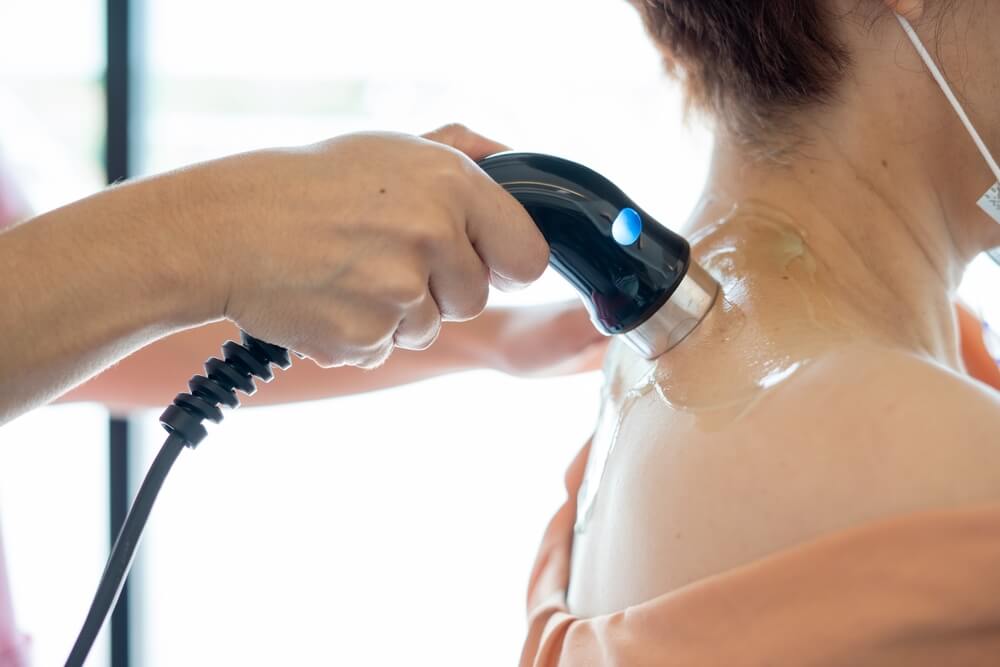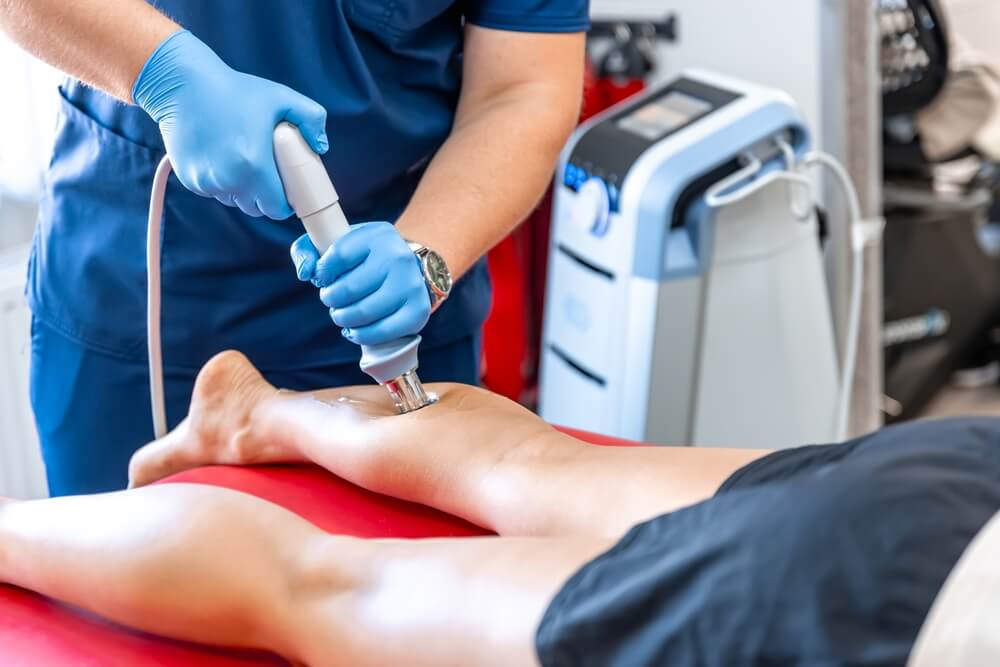
Introduction:
Pain is one of the most common reasons people seek medical treatment. Whether caused by an injury, chronic condition, or post-surgical recovery, finding effective ways to manage pain is crucial for improving quality of life. Shock wave therapy, also known as extracorporeal shock wave therapy (ESWT), has become an increasingly popular non-invasive treatment option for pain relief. But what does the research say? Let’s explore the evidence supporting the use of shock wave therapy for pain management.


What is Shock Wave Therapy?:
Shock wave therapy involves using high-energy acoustic waves to stimulate healing in tissues affected by pain. The process works by sending targeted sound waves through the skin to the area of pain, stimulating circulation, tissue repair, and reducing inflammation. Shock wave therapy is primarily used for musculoskeletal conditions, including gluteal tendinopathy (hip/buttock pain), tendonitis, plantar fasciitis, and calcific shoulder tendinopathy.
How Does Shock Wave Therapy Work?
Shock wave therapy delivers a series of high-pressure waves to the painful area. These waves promote:
1. Increased Blood Flow: Shock waves stimulate local circulation, which helps deliver oxygen and nutrients necessary for healing.
2. Collagen Production: Collagen is essential for tissue repair, and shock waves encourage its production in damaged areas.
3. Pain Reduction: The therapy can block pain signals, providing immediate pain relief.
4. Cell Regeneration: Shock waves trigger the regeneration of cells and tissues, aiding in the healing process of injured or inflamed areas.
The Growing Evidence for Shock Wave Therapy
Numerous clinical studies have investigated the effectiveness of shock wave therapy for pain management, particularly in musculoskeletal conditions. Let’s look at the evidence from some key studies:
1. Plantar Fasciitis
Plantar fasciitis is a common cause of heel pain, often affecting people who stand or walk for long periods. A study published in the *Journal of Orthopaedic Research* found that shock wave therapy significantly reduced pain and improved function in individuals with chronic plantar fasciitis. The therapy’s ability to stimulate healing in the plantar fascia tissue helps reduce inflammation and pain associated with this condition.
2. Tennis Elbow (Lateral Epicondylitis)
Tennis elbow is another painful condition caused by repetitive arm movements. A study published in The Clinical Journal of Pain demonstrated that shock wave therapy was highly effective in relieving pain and improving function in patients suffering from chronic lateral epicondylitis. The study showed significant improvements in pain levels and grip strength after a series of shock wave therapy treatments.
3. Calcific Shoulder Tendinopathy
Calcific tendinopathy of the shoulder involves calcium deposits in the tendons, causing pain and restricted movement. Research published in The American Journal of Sports Medicine showed that shock wave therapy significantly reduced pain and improved function for patients with this condition. The study concluded that shock wave therapy could be a viable non-surgical option for treating calcific shoulder tendinopathy.
4. Chronic Achilles Tendon Pain
Achilles tendonitis is a common injury that causes severe pain in the back of the leg. In a randomized controlled trial published in *The British Journal of Sports Medicine*, shock wave therapy was found to be an effective treatment for chronic Achilles tendon pain. The results showed that patients who received shock wave therapy reported less pain and improved tendon function compared to those who underwent other conventional treatments.
5. Myofascial Pain Syndrome
Myofascial pain syndrome (MPS) involves trigger points in muscles that cause referred pain. A study in the *Journal of Back and Musculoskeletal Rehabilitation* found that shock wave therapy was effective in reducing pain and improving mobility in patients with MPS. The treatment targets the trigger points, helping to alleviate muscle tightness and discomfort.
6. Trochanteric Bursitis/Hip Bursitis/Gluteal Tendinopathy (Hip/Gluteal pain)
A study published in the *British Journal of Pain* assessed the effectiveness of shock wave therapy for patients with trochanteric bursitis and gluteal tendinopathy. The results showed a significant reduction in pain and an improvement in functional mobility following a series of shock wave treatments.
Benefits of Shock Wave Therapy for Pain Relief
– Non-invasive: Shock wave therapy does not require surgery or injections, making it a safer alternative to more invasive treatments.
– Minimal downtime: Most patients can return to normal activities shortly after treatment, with few side effects.
– Effective for chronic pain: Shock wave therapy is particularly beneficial for chronic pain conditions that have not responded to other treatments.
– No medication required: Shock wave therapy helps manage pain without the need for pain medications or opioids, reducing the risk of drug dependence.
Who Can Benefit from Shock Wave Therapy?
Shock wave therapy is suitable for individuals suffering from a variety of musculoskeletal conditions, including:
– Tendonitis (e.g., tennis elbow, rotator cuff tendinopathy)
– Plantar fasciitis
– Achilles tendonitis
– Calcific tendinopathy
– Myofascial pain syndrome
– Heel spurs
It is also used for post-surgical recovery and rehabilitation after joint or tendon injuries.
Are There Any Side Effects?
Shock wave therapy is generally considered safe, but some patients may experience mild discomfort during or after the procedure. Common side effects include redness, swelling, or temporary soreness in the treated area. These symptoms usually disappear in a matter of days. It’s important to consult with a healthcare professional to determine if shock wave therapy is appropriate for your specific condition.
Conclusion: The Evidence Supports Shock Wave Therapy for Pain
The evidence supporting the use of shock wave therapy for pain management is robust and growing. Research consistently shows that shock wave therapy can effectively reduce pain, promote healing, and improve function for various musculoskeletal conditions. Whether you’re dealing with chronic tendonitis, plantar fasciitis, or Achilles tendon pain, shock wave therapy may be a promising treatment option to explore. Unfortunately, insurance has not yet caught up as we do not have enough long-term randomized controlled trials performed yet. Consequently, shockwave therapy is not covered by insurance. Call us today at 847-834-4018 if you’d like to schedule an assessment to see if shockwave therapy is the right treatment for you.
Dr. DeCaria is a double-board-certified doctor of anesthesiology and pain management medicine. She has years of experience and extensive training in the treatment of chronic pain.
Schedule your appointment with Dr. DeCaria of Revitalize Medical Center in Glenview, IL, to take the first step towards a long-term solution for your chronic pain!
